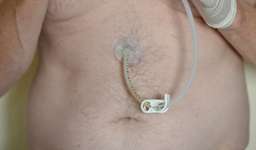
PEG Feeding Online Module
Cost: £6.00
Welcome to our PEG Feeding online Training. Upon completion, you will receive a certificate of completion. The course duration is approximately 1 hour and will earn you 1 CPD point. You have 6 months from the date of purchase to finish this training.This module covers various topics related to PEG Feeding online training module:
1. Introduction to PEG Feeding:
Overview of Percutaneous Endoscopic Gastrostomy (PEG) feeding, explaining the procedure, its purpose, and when it is required.
2. Anatomy and Physiology:
The relevant anatomy and physiology of the gastrointestinal system, focusing on the stomach and the insertion site for PEG feeding.
3. Indications and Contraindications:
The conditions and situations in which PEG feeding is indicated, as well as the contraindications or circumstances where PEG feeding should be avoided.
4. Equipment and Supplies:
This section familiarizes healthcare workers with the necessary equipment and supplies needed for PEG feeding, including the PEG tube, syringes, extensions, and securing devices.
5. Procedure and Techniques:
This part provides step-by-step instructions on how to perform PEG tube insertion, including pre-procedure preparations, patient positioning, and the actual insertion technique. It may also cover troubleshooting common issues that may arise during the procedure.
6. Care and Maintenance:
This section discusses the ongoing care and maintenance of the PEG tube, including hygiene practices, cleaning procedures, and monitoring for potential complications or infections.
7. Feeding Techniques:
This part covers different feeding techniques, such as bolus feeding, intermittent feeding, and continuous feeding. It also includes information on formula selection, administration, and monitoring for any adverse reactions or complications.
8. Complications and Troubleshooting:
This section highlights common complications and problems that may occur during PEG feeding, such as dislodgement, blockage, leakage, and infection. It provides guidance on recognizing and managing these issues effectively.
9. Documentation and Record-keeping:
This part emphasizes the importance of accurate documentation and record-keeping in PEG feeding, including intake monitoring, complications, and any interventions provided.
10. Ethical and Legal Considerations:
This section explores the ethical and legal aspects related to PEG feeding, including consent, patient autonomy, and decision-making processes.
The learning outcomes are:
1. Understand the purpose and indications for PEG feeding.
2. Identify the relevant anatomy and physiology of the gastrointestinal system related to PEG feeding.
3. Recognize the contraindications and precautions associated with PEG feeding.
4. Demonstrate knowledge of the equipment and supplies required for PEG feeding.
5. Perform the PEG tube insertion procedure accurately and safely.
6. Demonstrate proper care and maintenance of the PEG tube, including hygiene practices and monitoring for complications.
7. Apply appropriate feeding techniques for PEG feeding, including formula selection, administration, and monitoring for adverse reactions.
8. Identify and manage common complications and troubleshooting issues related to PEG feeding.
9. Understand the importance of accurate documentation and record-keeping in PEG feeding.
10. Recognize and address ethical and legal considerations related to PEG feeding.
We hope you find this module informative and beneficial for your professional development in PEG Feeding online training module.
If you need more information about this course, please contact Train Healthcare directly at 0208 3266 704 or email contact@trainhealthcare.com.
Please note that refunds are not available for online training purchases.
Nursing and Midwife Council's (CPD Points).
Requirements:
It is necessary to complete 35 hours (35 Nursing CPD Points) of relevant CPD within the three-year period since your last registration renewal or since joining the register.
Of these 35 hours (35 Nursing CPD Points), a minimum of 20 hours (20 Nursing CPD Points), should be dedicated to participatory learning, which involves engaging in activities that facilitate interaction with other professionals.

